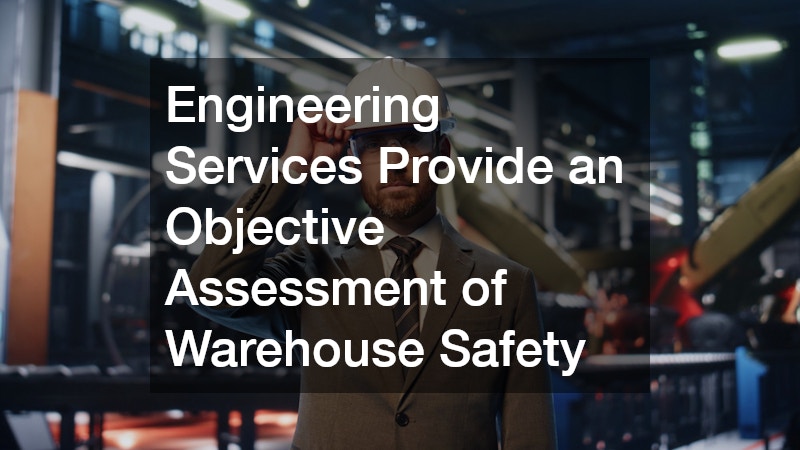Warehouse environments are dynamic spaces where goods, equipment, and personnel interact continuously. Ensuring safety in these spaces is not only a regulatory requirement but a critical factor in maintaining productivity and preventing costly accidents. Engineering services play a crucial role in designing, assessing, and maintaining safety protocols that minimize risks and protect both employees and assets. By applying specialized technical expertise, these services help organizations identify potential hazards before they become incidents, creating a culture of proactive safety management.
The importance of engineering services extends beyond simple compliance checks. These professionals analyze complex systems, review design and operational plans, and implement structured procedures that account for human error, equipment failure, and environmental hazards.
Their work ensures that every process—from material handling to chemical storage—is scrutinized for potential risks, ultimately fostering safer warehouse operations and more efficient workflows.
The Role of Engineering Services in Warehouse Safety
Engineering services provide the foundation for a systematic approach to warehouse safety. They combine technical knowledge, regulatory understanding, and process analysis to create comprehensive safety programs tailored to each facility. These services ensure that risk assessments, equipment inspections, and procedural evaluations are conducted thoroughly, helping organizations stay ahead of potential hazards.
Engineering services in warehouses involve detailed analyses of facility layouts, material storage protocols, and workflow processes. By reviewing project scopes and technical drawings, engineers can identify areas where accidents are more likely to occur and recommend safety improvements. Their insights guide management in creating policies that reduce incidents, such as optimized storage solutions, safe handling procedures, and ergonomic equipment placement.
Conducting HAZOP Facilitation to Prevent Hazards
Hazard and Operability (HAZOP) studies are a cornerstone of proactive warehouse safety. Through structured facilitation, these studies systematically evaluate processes to uncover potential risks that may not be apparent during routine inspections. HAZOP facilitation allows teams to anticipate hazards, assess their likelihood, and develop mitigation strategies before incidents happen.
HAZOP facilitation involves preparing color-coded P&ID diagrams, defining nodes for analysis, and facilitating detailed review meetings with trained scribes and facilitators. Each session produces recommendations and reports that outline specific process vulnerabilities, ensuring that warehouse operations comply with safety standards and minimize potential accidents. The meticulous preparation and documentation allow management to act promptly on identified risks, ultimately enhancing the safety culture of the facility.
Performing PSM and RMP Audits for Risk Management
Process Safety Management (PSM) and Risk Management Plan (RMP) audits are essential tools for maintaining regulatory compliance and operational safety. These audits systematically evaluate whether existing processes meet legal requirements and whether potential hazards are being adequately controlled. Through these reviews, engineering services provide an objective assessment of warehouse safety measures and identify gaps that require immediate attention.
PSM and RMP audits examine client-specific procedures, review maximum intended inventory lists, and verify simplified process flow diagrams. By conducting thorough in-house or virtual audits, engineers assess how well safety protocols are implemented, ensuring processes are both effective and documented. The resulting audit findings report offers actionable recommendations that reduce risks and support ongoing safety improvements within the warehouse environment.
Implementing Safety Recommendations from Audits
Once audits and HAZOP studies identify potential hazards, implementing recommendations is critical to achieving real safety improvements. Engineering services guide organizations in translating audit findings into actionable changes, which can include procedural updates, equipment modifications, or workflow redesigns. Effective implementation ensures that safety measures are not only documented but actively applied in daily operations.
Engineers may assist in updating facility documents such as maximum intended inventory lists or simplified process flow diagrams to reflect safer practices. They may also recommend adjustments in storage methods, improve chemical handling protocols, or optimize machinery layouts to reduce accident risk. By following a structured plan for implementing recommendations, warehouses can achieve measurable improvements in employee safety and operational reliability.
Maintaining Compliance Through Technical Safety Reviews
Ongoing technical safety reviews are crucial for sustaining warehouse safety over time. Engineering services conduct these reviews periodically to ensure that systems remain compliant with regulations and responsive to changes in operations, technology, or workforce conditions. Continuous evaluation helps organizations adapt to evolving safety standards and maintain a culture of vigilance.
Technical safety reviews may involve re-evaluating project scopes, revisiting audit recommendations, and conducting follow-up HAZOP sessions. By systematically monitoring these areas, engineers can verify that safety measures remain effective, identify emerging risks, and recommend updates before issues escalate. This continuous process ensures that warehouses operate at optimal safety levels while complying with all applicable safety regulations and standards.
Warehouse safety is a multifaceted challenge that requires more than basic compliance checks or reactive measures. Engineering services provide the technical expertise and structured methodologies necessary to proactively manage risks, conduct thorough audits, and implement effective safety measures. Their work ensures that warehouses are not only compliant with regulations but also optimized for the safety and productivity of employees and equipment.
By integrating engineering services into warehouse operations, organizations gain a partner in risk mitigation and operational excellence. From HAZOP facilitation to PSM and RMP audits, these services deliver actionable insights that transform safety protocols into tangible results. Companies that prioritize these technical safety reviews can prevent accidents, reduce downtime, and foster a workplace culture where safety is embedded in every process.

